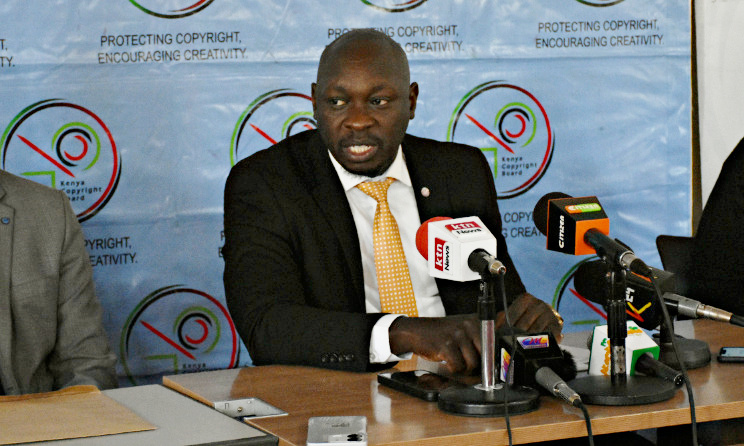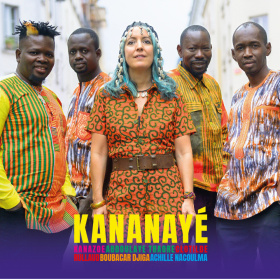Kenyan artists paid less than 10% of royalties in 2023 – KECOBO
Kenyan artists were paid less than 10% of the royalties that were due to them in 2023. This is according to figures provided by the Kenya Copyright Board (KECOBO), which is now pushing for a single collective management organisation (CMO) to collect and distribute royalties on behalf of rightsholders.
 KECOBO chairman Joshua Kutuny speaking in Nairobi on 21 February.
KECOBO chairman Joshua Kutuny speaking in Nairobi on 21 February.
The regulator said Kenya’s three licensed CMOs – the Music Copyright Society of Kenya (MCSK), the Kenya Association of Music Producers (KAMP) and the Performers Rights Society of Kenya (PRISK) – jointly distributed about Ksh26m ($178 000) in 2023 to artists instead of Ksh180m.
KECOBO said that based on information presented to it by the three CMOs, it established that a total Ksh250m (about $1.7m) was collected jointly from January to December 2023. KAMP collected Ksh61m but only paid out Ksh10m, while PRISK collected Ksh52.7m and paid out Ksh6.2m. The MCSK collected Ksh139m but remunerated rightsholders with only Ksh9.6m – well below the 70% that CMOs should pay from collections made. The MCSK collected Ksh30m from mechanical rights and Ksh109m from public performance rights, KECOBO said.
Speaking in Nairobi on 21 February, KECOBO chairman Joshua Kutuny slammed the CMOs for “utter lack of accountability and gross abuse of their mandate.”
“As per the copyright regulations, the CMOs ought to have distributed at least Ksh173m or 70% of that collection,” he said, adding that earlier this year KECOBO’s board of directors invited the CEOs and chairpersons of the CMOs to account for the royalties collected in 2023.
“A simple analysis of the amounts that would accrue to members were this revenue paid as the copyright regulations reveal that each artist could earn at least six times the amount paid during the year in royalties,” Kutuny said.
He said royalties were paid out only for Q1 2023 collections. “All the societies did not set aside royalties from collections in quarter two, three and four despite the improved business environment.”
The CMOs were then requested to submit further information and documentation, including detailed income reports, legal fee breakdowns and evidence of allocations for final royalties in 2023. However, since most of the information provided failed to answer key accounting enquiries, the matter had now been referred to the Ethics and Anti-Corruption Commission (EACC) and the Director of Criminal Investigations (DCI) for investigations and possible prosecution.
Responding to the allegations, KAMP chairperson Angela Ndambuki said KECOBO’s numbers were incorrect, as it had not considered all the documents the CMO had submitted with the regulator.
“This essentially means that KAMP’s distributable income stood at 41% and not 10% as highlighted,” she told Music In Africa. “It may not be the desired 70% but we are well on our way to achieving the targets with improved tariffs and structures. This is exhibited by this year’s performance where for the first time KAMP began the year on a positive note by putting aside 61% for distribution.”
Ndambuki added: “Throughout the years, KAMP has responded to all of KECOBO’s requests and clarified any misconceptions including the forensic audit. We have kept KECOBO apprised of all the challenges we have faced and have worked closely with KECOBO to streamline collective management including improving tariffs and distribution.”
In July 2023, Ndambuki responded to a forensic audit that was made public by Kenyan media implicating KAMP and PRISK for failing to remit millions of shillings in royalties to artists.
KECOBO has now tabled sweeping proposals aimed at reforming the music royalties’ collection and distribution sector, including the formation of a single state-led CMO through the repeal and replacement of the Copyright Act through the Copyright and Related Rights Bill 2023, which is awaiting Cabinet approval.
KECOBO is also pushing for all performance and mechanical royalty collections to be submitted through the government’s eCitizen portal to improve accountability.
KECOBO executive director Edward Sigei said: “All they [the CMOs] have done is repeatedly point the finger at the regulator instead of focusing on working in the best interest of their members. All they do is come up with excuses for failing to do their job and we are saying it’s time this is put to an end for the sake of the artist.”























Commentaires
s'identifier or register to post comments